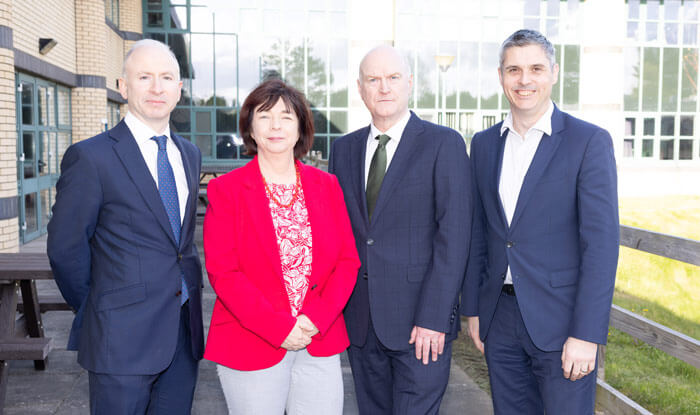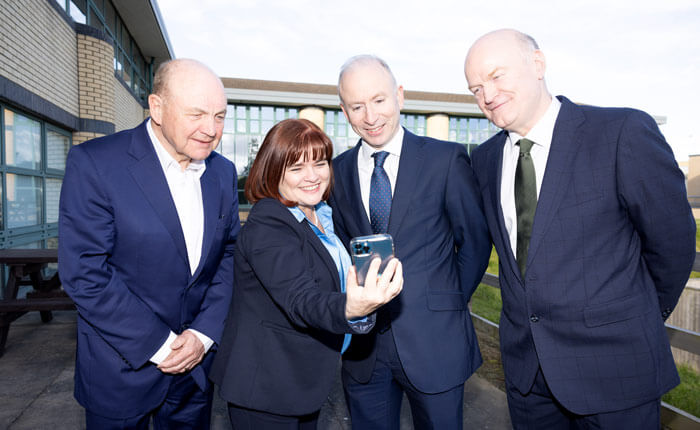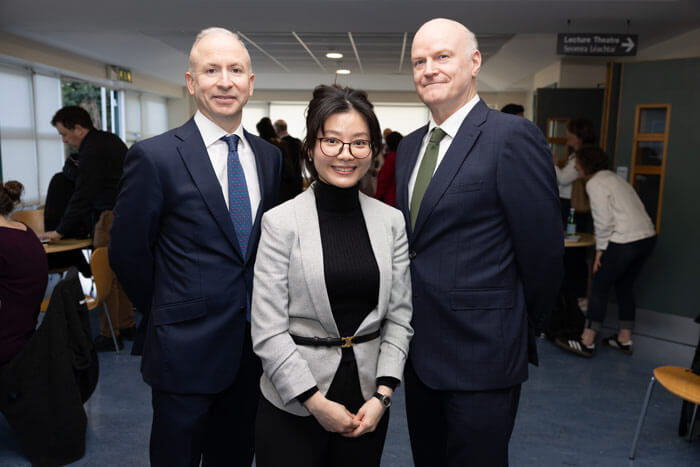
A new AI-powered technology, driven by a smartphone app hailed a significant breakthrough is helping doctors at Tallaght University Hospital (TUH) diagnose early Alzheimer’s and supports identification and recovery in many other serious conditions.
GaitKeeper measures walking speed which is often referred to by doctors as the “sixth vital sign.”
A spokesperson for TUH said GaitKeeper was so sensitive it could even indicate if someone could be living with early symptoms of Alzheimer’s disease or other disorders that affected the brain. “This is important as new drugs (expected to be approved in Ireland this summer) will for the first time offer treatments to those in the early stages of the disease.”
This new software has been developed by Dublin City University principal investigator Dr. Aidan Boran, working in conjunction with consultants, physiotherapists, and patients at TUH. He said, “GaitKeeper uses AI computer algorithms to analyse a person’s walk, by using a single video recorded on a mobile phone, making it very portable, and very easy to use. Working with the AI, our Augmented reality app ensures the solution is very consistent and standardised in all settings.” The development of GaitKeeper was significantly funded by Enterprise Ireland through their Commercialisation Fund Programme, and supported by the Insight Centre for Data Analytics, DCU Invent and Innovate Health at TUH.
Professor Seán Kennelly Consultant Geriatrician and Director of the Institute of Memory & Cognition at TUH was lead clinician investigator in the GaitKeeper project. He said, “Up until now gait analysis in clinical settings has been very limited, not because it is not important, but due to the expense, inaccuracies, high level of training required and the space that equipment takes up. This new technology changes all of that. Using AI and AR, the GaitKeeper app captures over 20 points on a person’s body, 60 times per second as they walk, using a phone. This app represents a significant breakthrough and means gait assessments can be conducted by anyone, anywhere, at any time. Gone is the need for specialised equipment like sensors, mats, or special clothing. The assessments can be done in nursing homes, GP practices, outpatient clinics, on hospital wards, and even in someone’s own home.”
For patients with chronic diseases such as Parkinson’s disease, multiple sclerosis, or arthritis, walking speed serves as an indicator of disease progression and response to treatment. Doctors at TUH believe that including walking speed assessments in regular clinical practice can significantly enhance patient care by providing a clear and objective measure of an individual’s functional abilities and overall health status.

GaitKeeper collects longitudinal data on walking speed, support base, swing, flexion, and symmetry measures. It is already being used in TUH to gauge frailty status – identifying increased risks of adverse events such as falls, prolonged hospital stays and overall functional decline.
Those involved in the creation of this cutting-edge new technology believe that developing accessible technology that measures subtle changes in gait performance easily and accurately will enhance the detection of declining health and the timely delivery of care to older people. Critically it is hoped this will mean the necessary medical interventions occur ahead of significant falls or other illnesses, when treatments are more costly, take more time, and — most importantly — have poorer results for the patient.
Frailty is a significant concern for healthcare systems all over the world, particularly those with an aging population. Studies have demonstrated that slower walking speeds in older adults are predictive of adverse outcomes like falls, hospitalisation, and even mortality. However regular monitoring of walking speed can guide interventions aimed at preventing mobility loss and maintaining independence in older adults. Understanding and managing frailty is crucial for healthcare professionals and policymakers, given its significant impact on health services and associated costs.
Falls are another significant cause of health decline as people get older, and are associated with over €500 million healthcare costs in Ireland annually. An exciting project led by Dr. Paul McElwaine, Director of Falls Unit in TUH will use GaitKeeper in the Hospital Falls service, to estimate people’s risk of falling, and thereby direct them towards interventions to prevent that fall happening.
Dr. McElwaine said ”International guidelines have always recommended the importance of gait speed as an important indicator of someone’s risk of falling, but for lots of reasons this has been significantly challenging to implement in clinical settings. GaitKeeper addresses all these issues and is a real breakthrough in allowing for easy and accurate measurement of gait speed in falls clinic and acute care settings, so that we can focus resources to those most in need to prevent future falls”.

A JAMA medical study has found that those with the highest gait speed had a much lower relative risk of falls compared to those with the lowest gait speeds (RR = 0.23, 95% CI, 0.11 to 0.5). In the same research, the average gait speed of those who did not fall was 0.80 m/s, compared to 0.67 m/s for people who fell. The GaitKeeper test enables doctors to easily and quickly identify if a patient is high risk in terms of falling, so that necessary supports can be put in place to help the patient avoid significant injury.
One of the advantages of using gait speed as a clinical measure is its cost-effectiveness. The test requires minimal equipment, which is inexpensive and often already available in clinical settings. The test is quick to administer, usually taking less than five minutes, including setup and measurement. Healthcare professionals can easily perform the test without needing specialised training.
Ciaran McGuinness, Head of Sales for Cardiac Services who will distribute this innovative new technology says, “We are thrilled to announce our partnership with Digital Gait Labs and the launch of their ground-breaking technology, which offers the capability to easily and accurately measure subtle changes in gait performance among patients. This innovative solution represents a significant leap forward in healthcare, providing healthcare professionals with invaluable insights into the mobility and functional abilities of their patients.”
The GaitKeeper technology is a CE marked, class one medical device and is now available to buy on license from DCU spin-out company Digital Gait Labs.

